Get ready to meet Pothos royalty.
A dappled darling that will take the world by storm. Honestly, with its delicious variegation, I can see why the Marble Queen Pothos is such a popular plant.
And – like all members of the hardy Pothos family – she is super easy to look after, verging on indestructible.
Like a good Queen, she’ll love you just as much as you love her. So, if you take care of her well, she’ll be a stunning addition to any home or terrarium project.
Here’s how!
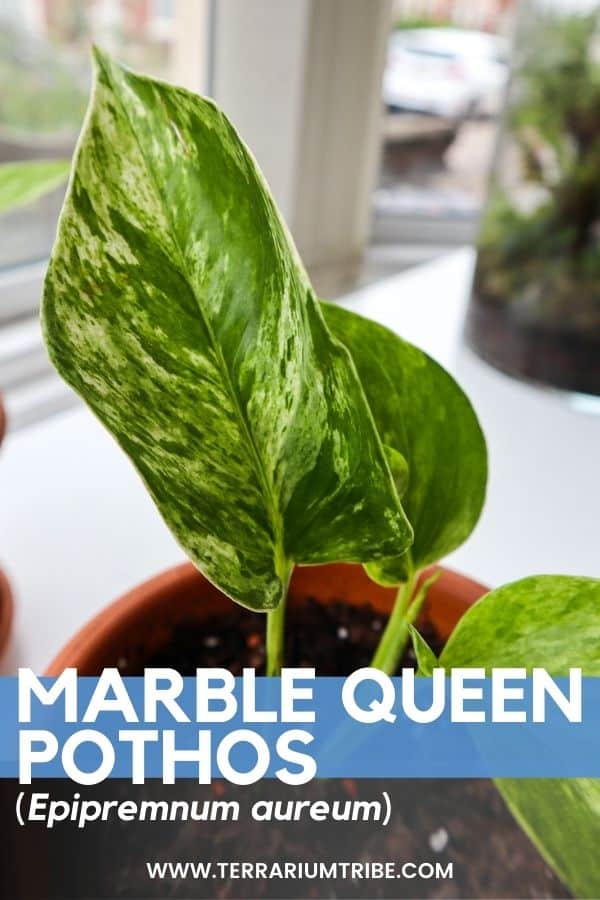
Say Hello to the Marble Queen Pothos
The Marble Queen is possibly one of the most gorgeous indoor plants you’ll come across.
Not to mention, if there’s any plant famed for consistently winning the “Fast-grower Award” – it’s the Pothos.
Like many others of its lineage, the Marble Queen Pothos also goes by its scientific name Epipremnum aureum, as well as Devil’s Ivy, Money Plant, and more (just to be difficult).
She looks delightful as a dangling vine trailing down from a high shelf or climbing up a moss pole, trellis or terrarium background.
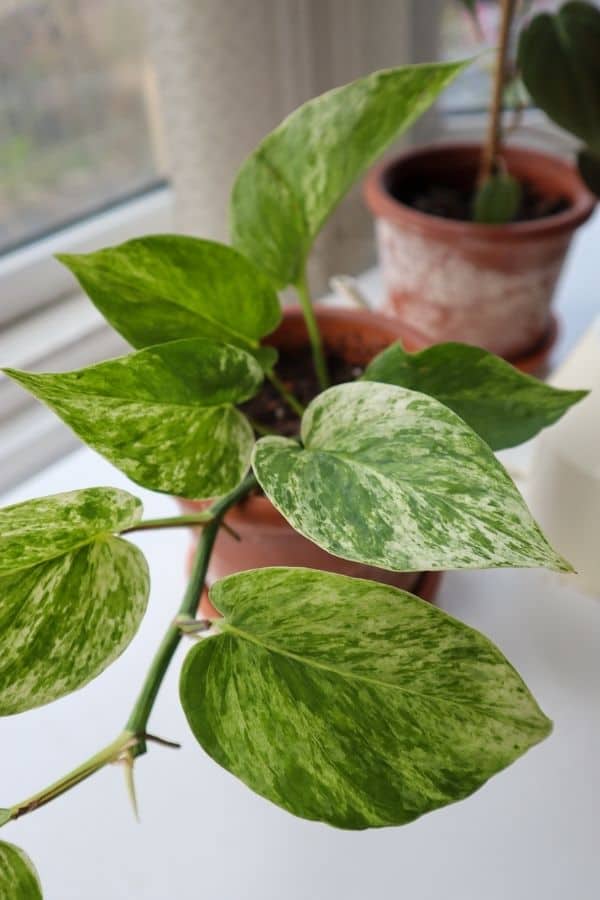
I’ve even seen people train their plant to climb the wall of their home (if my landlord had a space in his heart for a beautiful unruly climbing plant I would absolutely be joining the club – it looks dreamy).
A true tropical beauty, this plant originates from the South Pacific rainforest and is one hell of an aggressive grower.
And, not just a pretty face, it’s famed for air filtration. It removes harmful chemicals and common household toxins from the air. Just as the rainforests are the lungs of the planet, the Pothos will be the lungs of your home.
What’s not to love?
Where to Buy the Marble Queen Pothos
See the links below to purchase from reputable terrarium plant shops and marketplaces (may include affiliate links).
Marble Queen Pothos Care & Growth
At a Glance
| Plant Type | Vine, foliage, large |
| Lighting | Bright indirect light |
| Temperature | 60-90°F (16-32°C) |
| Watering | Moderate, even moisture |
| Humidity | Moderate to high humidity (60-95%) |
| Growth | 10ft+ vine |
Lighting
Bright indirect light is the gold standard for tropical house plants, but you definitely have some wiggle room with the Pothos.
Seen in nature, this beauty is a vining plant that climbs up the rainforest trees. It’s able to grow in the shade beneath the canopy and continue growing when it bursts into the light.
So, it can tolerate quite a range of light conditions, and you can likely get away with both low light and some direct light.
In the summer months, I have mine a few feet away from a southeast facing window where it receives glorious direct sunlight in the morning and then bright indirect light for the rest of the day.
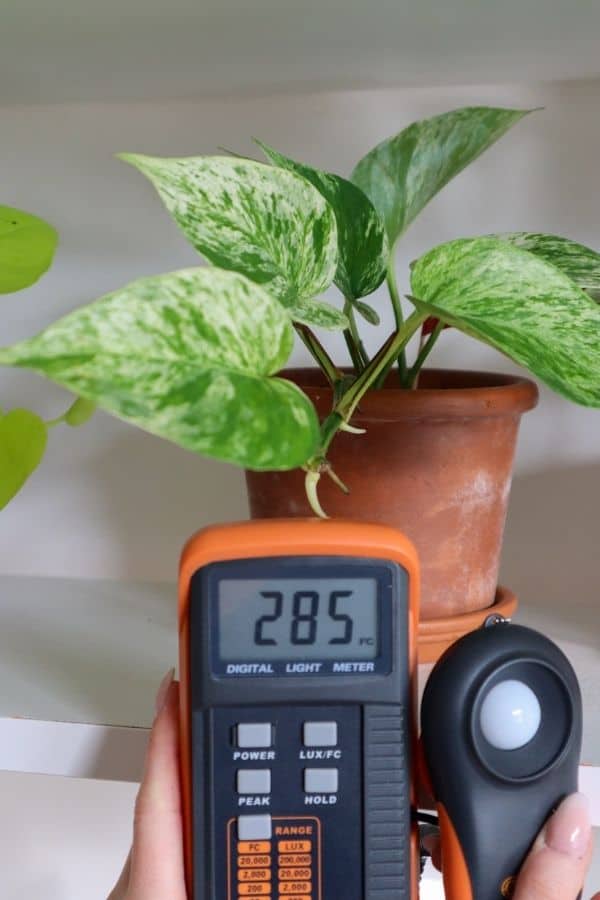
In the colder months, my Queen will take center stage on my window sill and soak up as much light as it can.
Of course, this depends on where you’re situated. If you live somewhere that has scorching summers and lovely sunny winters, well.
- Take me with you and
- You might need to move your plant further away from the light source than I have mine.
With this particular Pothos plant, a low light spot might result in stunted growth, and you could lose some of the variegation if the plant struggles to photosynthesise, making it more green in colour.
Too much direct sunlight and your plant could crisp up and you’d see brown leaf tips.
Watering
As with any tropical plant you really don’t want your Marble Queen Pothos sat in wet soil. You’ll run the risk of root rot, which can lead to yellow leaves for your plant and heartbreak for you.
So, PLEASE give this lovely lady a plant pot with a drainage hole. It will make watering this plant a hundred times easier and save you from a potential disaster.
I like to soak the plant until I see a little water coming into the drainage tray and tip that excess water out.
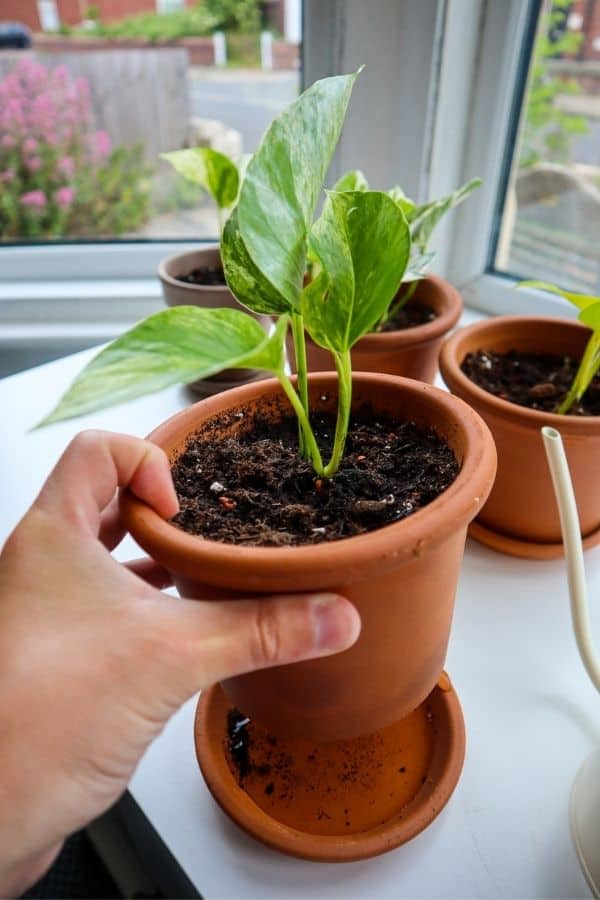
When the soil moisture feels dry to the touch but not yet bone dry (not just on the surface – stick your finger in to check), I repeat the process.
This mimics the watering frequency you’d see in the rainforest, where the vine would get soaked and then dry out in between rainstorms.
Don’t worry if you forget about it for a few days – this is a low-maintenance plant and is reasonably drought-tolerant.
If you leave it too long, you’ll likely see droopy leaves.
If you’re going for a terrarium build, I’d definitely recommend adding a false bottom. It doesn’t need to be fancy and can really protect your Queen from root rot. Also, try adding a little water at a time so you don’t drench and overwhelm the system – it’s easier to add water than remove it.
Oh, and this plant isn’t picky – tap water will do fine (though if you’re putting it in a terrarium use deionised water to prevent residue buildup on the glass).
Substrate / Soil
Think of your substrate as a throne for your Queen – she deserves more than just your average soil.
A chunky, well-aerated aroid potting mix will do the trick! This plant likes plenty of root aeration and moisture, so I’d recommend a mix high in coco coir and orchid bark.
Throw in a bit of perlite for good measure, and your Pothos will thank you forever.
I’ve also heard some people on the internet actually grow their plants without substrate – just in water. I’m sure you can see that this is absolutely criminal, but I felt the need to tell you anyway to run away from that advice as fast as you can.
Temperature & Humidity
Like me, the Marble Queen prefers delicious warm temperatures.
Your Queen will be happy anywhere in the range of 60 – 90 degrees, but I’d definitely aim for 70+ for optimal growth.
The similarities between myself and the plant only continue because it too thrives in high humidity environments. I’m starting to think I might just be a Pothos…
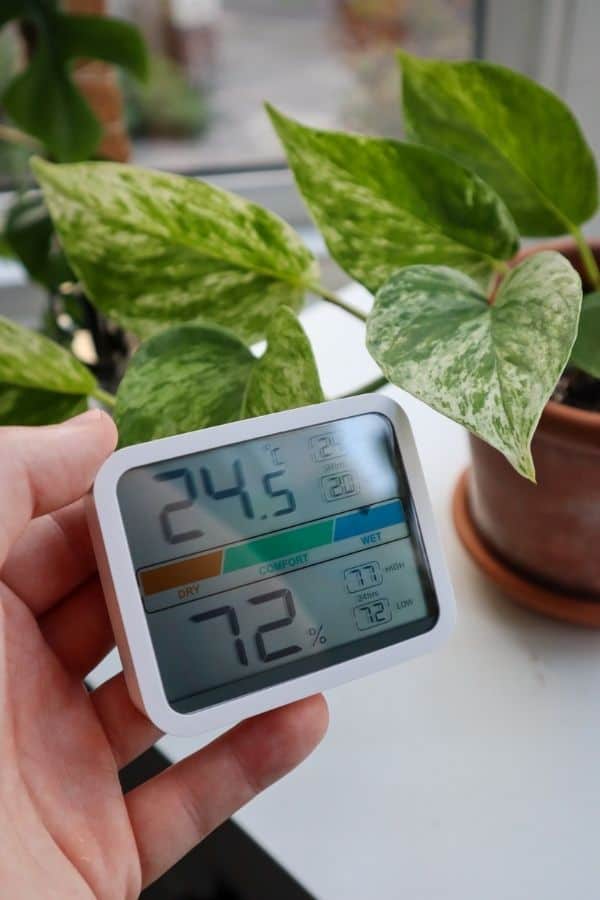
Aim for humidity in the range of 60-95%. Any less, and you might get crispy leaves.
Just another reason why the Pothos is a wonderful fit for a terrarium!
As a potted plant, this gal would enjoy a little regular misting, too. It can help temporarily create a more humid environment, but the real benefit lies in encouraging the aerial roots to develop.
Growth
As with all Pothos plants, this Queen has a growth rate comparable to the speed of light.
So, while she’s a warm temperature and humid environment lover, she’s only a good terrarium option if you’re willing to give her regular pruning and trimming and/or have an extra large terrarium.
Bigger is better in the terrarium world, for sure.
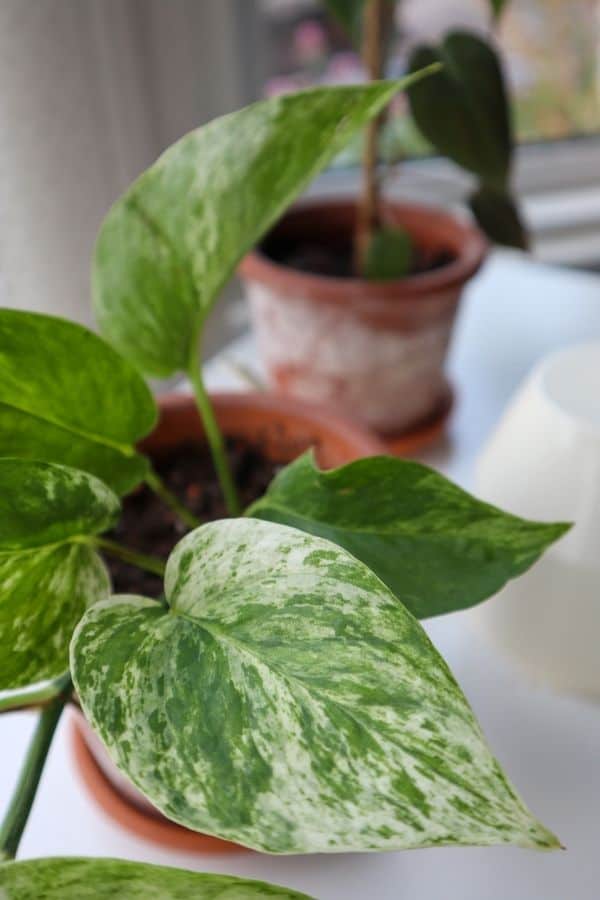
In the home, it performs best either given something to climb or dangle from with it being a leggy vine. I want mine spilling from the shelves.
If you want a fuller plant, giving it a trim will promote bushy growth. Planting propagated cuttings back into the mother plant will help, too!
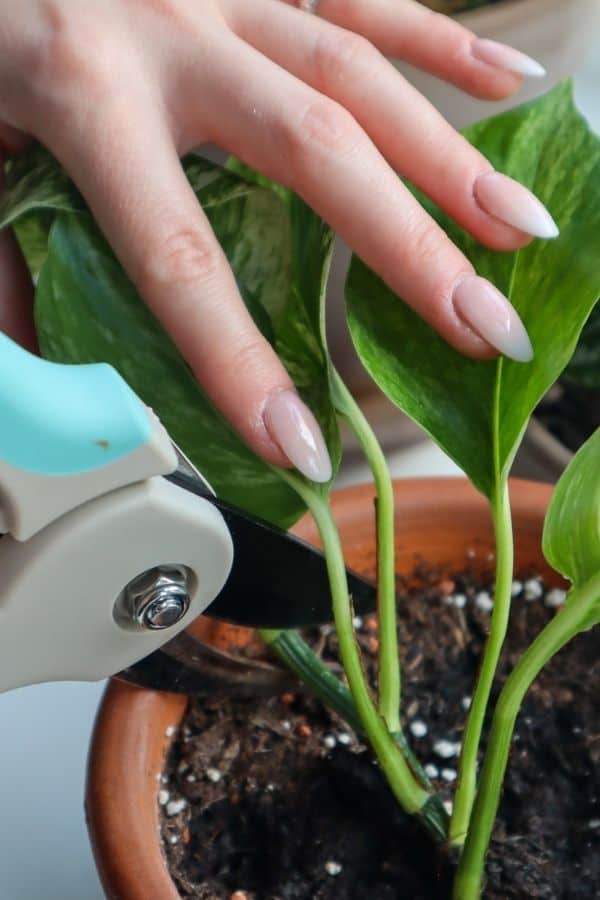
Indoors, these beautiful plants can reach 10+ ft quite easily, and in the wild they’ve been measured up to 70+ ft and have the hugest leaves with Monstera-esque fenestrations.
Propagation
Don’t be surprised if you find yourself falling head over heels in love with the enchanting darling that is the Marble Queen.
Thankfully, if you just can’t get enough – she is fruitful and will readily multiply via a simple cutting process. I like to wait until I have a long, healthy vine and do several stem cuttings at once – but you don’t need to!
Just grab a pair of scissors and cut beneath each leaf node (so you have a leaf and a node) and put it in a bit of water.
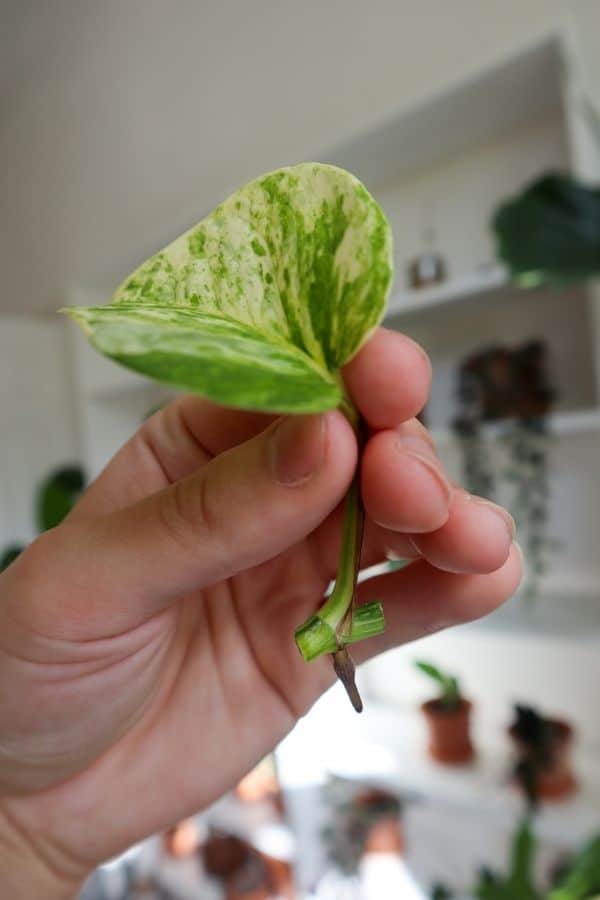
It really won’t take long for a root to grow from the leaf node. Wait until it’s a few inches and plant up in fresh soil – I’ve never not had a Pothos cutting thrive.
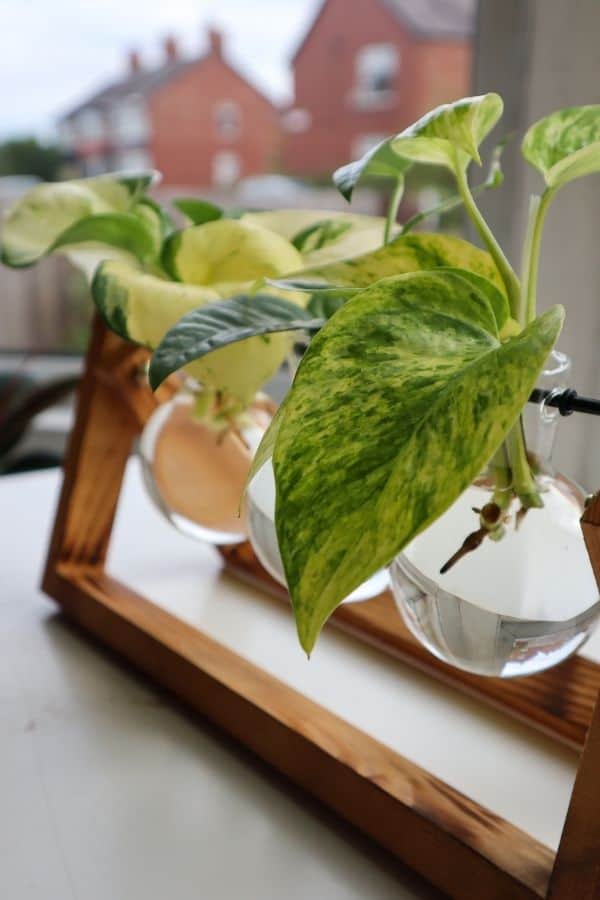
I really want to try planting a few different Pothos Variations in the same pot for a colorful explosion of Pothos magic. Watch this space…
Varieties & Similar Plants
Honestly there’s a lot of variation just within the Marble Queen, they range from extremely speckled with very little green to more green and less variegation.
Color-wise, the variegation can be anywhere between white and yellow.
But stepping outside the Marble Queen for a moment, there are so many wonderful Epipremnum aureum varieties to get your teeth stuck into!
Here’s just a few:
There’s even a Satin Pothos, although it belongs to a different genus!
So, what’s the deal with the Snow Queen Pothos? Is it the same as the Marble or different?
In my research, I found quite a few people who said that the Snow Queen Pothos is just a Marble that’s had lots of sun, giving it more white variegation.
As an avid Frozen fan I’m deeply disappointed, I was going to get one and call her Elsa.
Frequently Asked Questions
Green leaves are a sign of your plant not getting enough light. If it’s struggling to photosynthesize, this particular Pothos variety can lose variegation and brightness. Try moving it into brighter light.
Too much direct sunlight can scorch the leaves and lead to your plant developing brown leaf tips. Try moving the plant into a spot where it gets indirect sunlight instead.
Yellow leaves can be a sign of just about anything, but you’re probably overwatering it. Make sure you have a pot with a drainage hole, and you don’t have your plant sat in water. Regular watering when it’s dry to the touch is the way to do it.
Honestly, I don’t think so. Some people on the internet think that the Snow Queen is a separate plant but it seems that it’s just a Marble Queen that’s received lots of light and so has more white variegation.
